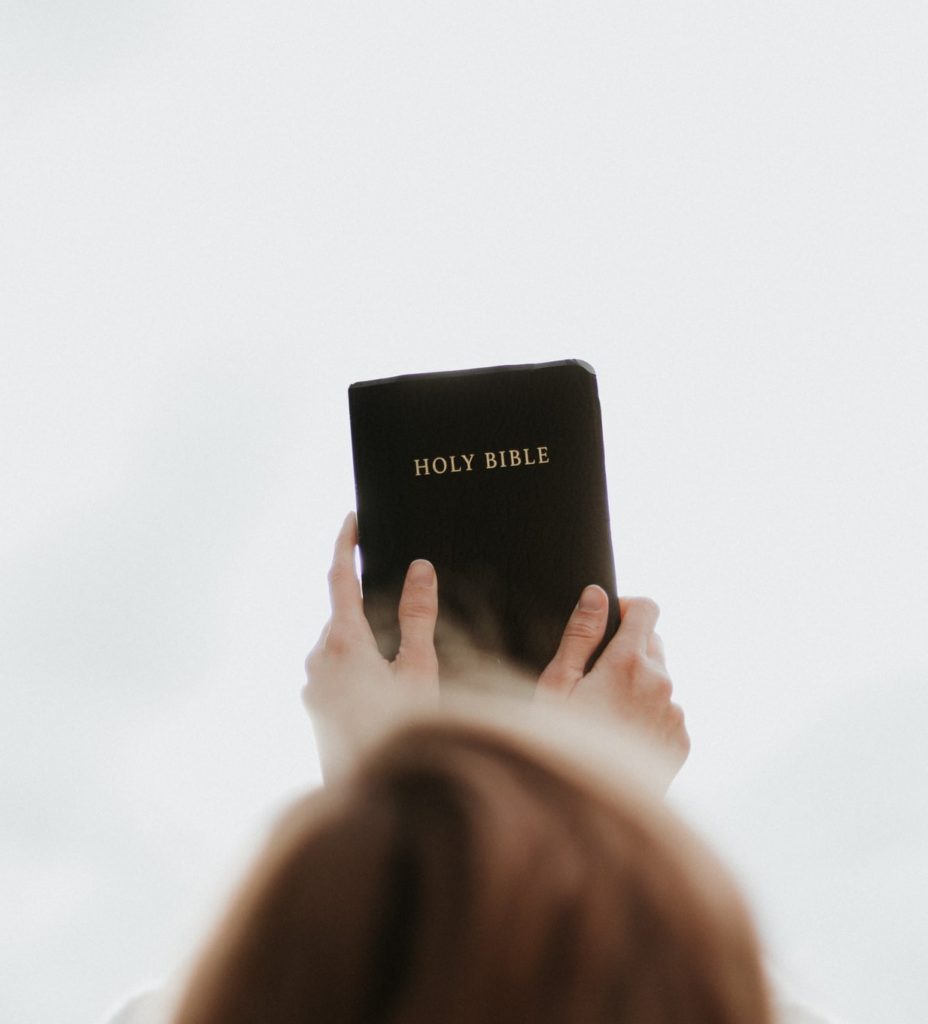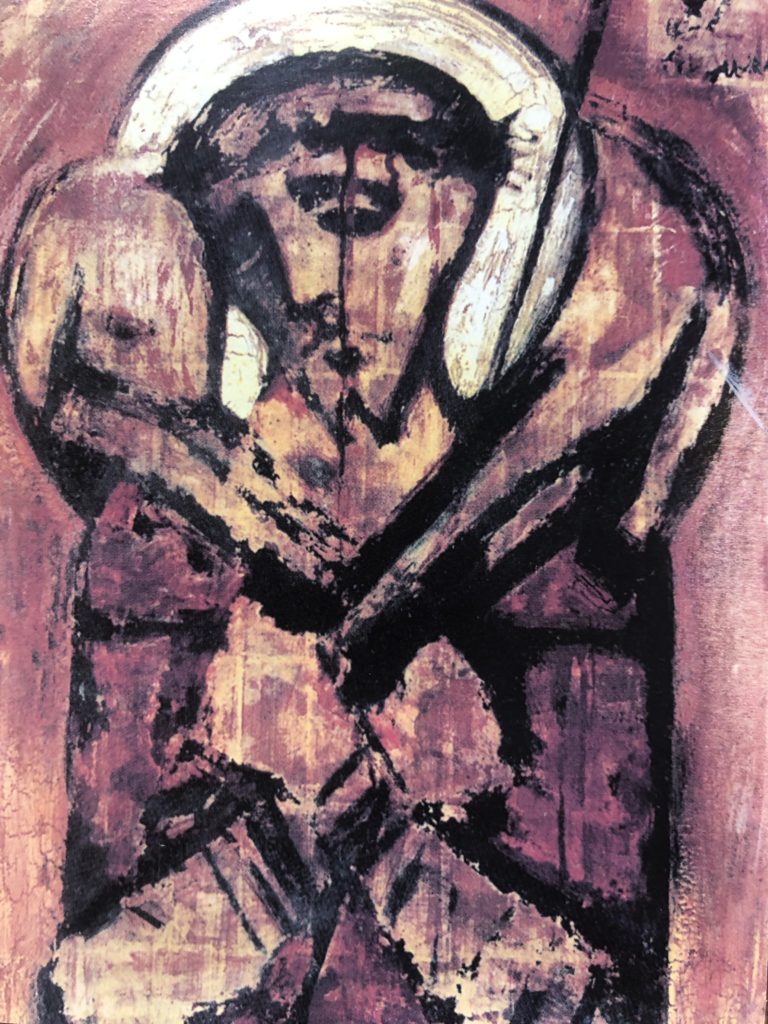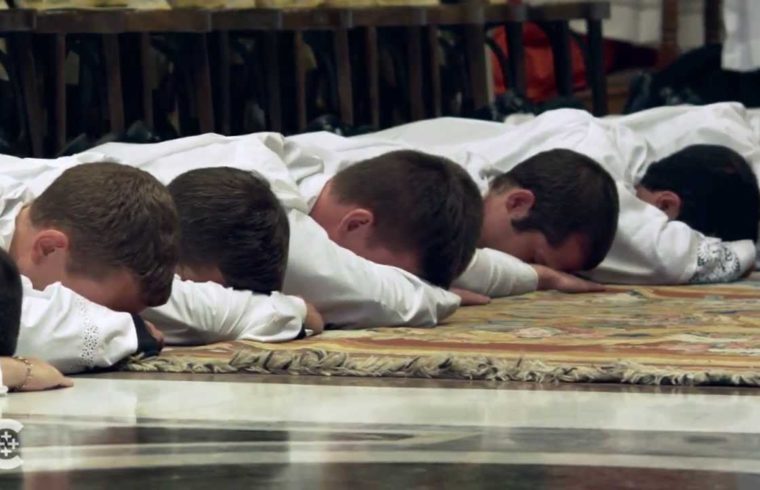On Friday, one of our FOCUS missionaries here (recent college grads who dedicate a few years of their lives to serve their peers in order to grow in their relationship with Jesus Christ) had invited me to be a part of his bible study (on Zoom). Over the year, he had befriended a group of really good guys who’ve been meeting regularly and wanted to have an opportunity to, as we affectionately call it around here “grill your chaplain.” In these “grills”, students are invited to ask any question of their choice. Without fail, questions go in all directions, such as “when did you first think about becoming a priest” “what’s your favorite Gospel” “what were some of the other career paths you were thinking about.” Those are some of the “getting to know you” questions. They can trigger a lot of thoughts and memories – especially with my A.D.D. Get me telling a lot of different stories. Then there are questions about why the Catholic Church believes certain things or certain disciplines, like- Why do we have to go to Mass on Sunday? When did the Eucharist first get instituted? Hopefully I am able to answer in a correct, relatable manner and make up for what they didn’t ever learn or remember from when they were growing up. Finally, some questions find a way to kind of touch both -they’re asking about the Church teaching and indirectly seeking your personal take on it. For example, one of the guys asked me “why can’t priests get married.”
Hi everyone here’s my homily for FOURTH SUNDAY OF EASTER – MAY 3, 2020. During this time of public Masses being suspended, I invite you to pray with us as we pray for you on our FACEBOOK PAGE cick here Thanks so much for stopping by to read this and even more for sharing it on your Facebook, Twitter, Instagram and everywhere else people share social media posts and your feedback and comments! For the audio version you can get them at SOUNDCLOUD click HERE or from ITUNES as a podcast HERE. Thanks again – HAPPY EASTER! I hope you and yours experience all of God’s blessings today and always! In Christ – Father Jim
While this is not the first time I’ve been asked about celibacy before, I was kind of surprised by the question. Not in a bad way or anything like that. Mostly because this was a guy I hadn’t really met before, and the questions for the most part (for the first 40 minutes) or so had really been getting to know you type stuff or just “Catholic potpourri.” And so, I kind of stumbled in my answer. I found myself talking about how there are married Catholic priests – my point being that it is a discipline that the Church could theoretically change. Then I explained that we’re trying to follow the example of Christ who was never married and allow ourselves to be radically available to the people we’ve been called to serve. And honestly, I wouldn’t be surprised if it sounded like “yadda, yadda, yadda…” In all honesty, I wasn’t satisfied with my answer. Which really bothered me. Why? Mostly because my A.D.D. was working in overdrive when he asked the question… I was more focused on why the guy was asking – where was he coming from.
I started thinking about the fact that some prominent voices in recent months have said that celibacy should be done away with completely (or the more politically correct way that it is usually stated, that it should be “optional”) so maybe he had read a story about that and wanted to gauge my honest opinion on those proposals. Or
Maybe some of these guys were Non-Catholic Christians – we happily have a bunch of kids who feel at home here and aren’t Catholic – so perhaps he was asking why a Protestant pastor was able to marry and we weren’t? Or
Honestly, after years of just atrocious news about the actions of some priests AND Bishops who’ve sexually abused, harassed, who committed gross sexual crimes, covered them up, and so on… people have thought celibacy is unnatural to begin with so they naturally link it to abhorrent behavior. Being chaste, being celibate used to be seen as a way of holding up the beauty of sex, something special, something sacred – something a husband and wife shared in marriage. Priest’s sacrificing that was seen as a way of affirming sex as tied to the vocation of marriage and that it was a distinct and different call then the call to priesthood. But hearing about these failures of epic fashion, which understandably have made headlines around the world, has undermined the beauty of celibacy as a gift and made it an object of suspicion. This guy asking me this question on Friday didn’t say it, but I reminded me of a fire fighter in West Orange, where I still serve as their chaplain, saying to me this one time, “Father you seem normal, why would you do this? Why wouldn’t you want to get married?” Or
In all fairness, it doesn’t even have to be those extreme, horrific examples. The truth of the matter is that more often people have personal experiences as well – stories that don’t make the news, stories that aren’t sexual deviant or scandalous in that realm. But stories they themselves had experienced where a priest just wasn’t good enough to them. Whether it was a blatant dereliction of the priest’s duties and responsibilities – or if the priest himself didn’t even realize that his action (or lack thereof) hurt a parishioner: our priest never came to visit my mother when she was dying… we tried to get married at that Church and the priest wouldn’t meet with us because we were living together… I wanted to get my son baptized and no one called us back. This “quarantine” time has opened up a whole host of new experiences that will fall into this category as well. A few weeks into the shelter-at home orders, I remember getting a message saying that my decision not to defy those orders to celebrate Mass publicly, to offer to hear confessions, was a massive failure on my part (that’s putting it charitably, but that basically summed up the message). If you follow my social media, it will become evident to you that I was stung by that and responded with a twitter rant. (I’m a priest, but I’m also Italian). In response, people very kindly and overwhelmingly came to my defense – mostly because these people know me personally and were defending me on a personal level. But I have been able to hear the hurt that those comments were trying to say, especially as the days and weeks of this isolation period have gone on longer and longer. They are saying, one of the reasons you don’t have a wife or kids of your own- is that you’re supposed to be here for us, where are you?… right or wrong, many have felt we haven’t been, so that too inevitably leads to more questions and more doubts. Why aren’t you married, why are you celibate?
 As my mind was trying to figure out whether the guy asking me this question was asking from any of those perspectives… in hindsight, I didn’t feel like I really gave him a good answer – which genuinely bothered me because it’s a good and important one. I felt unsettled which only worsened as I sat down with this Gospel reading again Friday night and all day yesterday.
As my mind was trying to figure out whether the guy asking me this question was asking from any of those perspectives… in hindsight, I didn’t feel like I really gave him a good answer – which genuinely bothered me because it’s a good and important one. I felt unsettled which only worsened as I sat down with this Gospel reading again Friday night and all day yesterday.
Every year on the 4th Sunday of Easter, we celebrate “Good Shepherd Sunday” – where the readings [you can read them here] focus on that imagery – God as a shepherd. It’s something that comes up a lot throughout both the Old and New Testaments. For the Jews, their greatest of kings, David, was notably a shepherd before being anointed a King. The psalm we heard today is one of the most treasured of all the psalms, “The Lord is my shepherd” – leading us through verdant pastures, protecting us as we walk through dark valleys. Truth be told, those images are comforting even in the non- farm like of cultures. Especially during rough times like we’re experiencing right now… That comforting image of God protecting and guiding us is a beautiful image we want to cling to and even more, long to experience.
But all week, I had been struggling with this Gospel. Because yeah, we hear about sheep and shepherds. But Jesus is not as clear, direct and definitive in this section calling himself “The Good Shepherd. Think about it – the most direct thing Jesus said was – “I AM THE GATE.” In the Gospel of John, Jesus very often uses these very definitive “I AM” statements. Just saying “I AM” assumes great importance. Thousands of years earlier when Moses first encountered God Himself in the burning bush and asked His name, God replied “I AM.” Jesus uses that answer not only to reveal that He is God himself (which is one reasons the Jews wanted him crucified, as they considered this response to be the ultimate of blasphemies); He also expands on that to reveal other aspects of God’s identity. As an example, this past week in daily Mass in the Gospel, we heard Jesus say “I AM the bread of life; ” “I AM the living bread that came down from heaven” all describing the Eucharist we receive, where we eat His actual body and blood. Later in the Gospel of John, He says, “I AM the way, the truth and the life”, thus establishing the singular importance for us to follow Him. He will also blatantly say “I AM the Good Shepherd” in the Gospel of John. But just not today. Which is why I was struggling. He talks about sheep and shepherds and what their roles are. But today’s “I AM” statement is this: “I AM the gate.”
That’s what tripped me up. I kept thinking about just a physical gate – a metal gate that closes a pen which sounds rather cold and impersonal. We imagine the gate as a barrier. Which is hardly relatable or an image we want to have of Jesus. I had to research it a bit because I forgot the depth of what Jesus was getting at in saying that. He wasn’t describing himself in a blockade, or as an impediment to keep those of us who want to come close to Jesus distant.
In this instance, the Shepherd has such deep concern, and dedication – He recognizes that these sheep are dependent upon Him for guidance, direction, and protection – that the Shepherd Himself sleeps in the opening between the pasture and the sheepfold. This is one of the things that makes him a “good shepherd.” He doesn’t trust a metal or wooden gate – because, a robber can just jump over and steal one of the sheep. He doesn’t hire someone to watch who might fall asleep, or bail at the first sign of trouble. Owing to the fact that sheep are docile and don’t really have any defense, He doesn’t want them to be vulnerable in any way. Especially since they’re prime targets for wolves. The Good Shepherd knows that a wolf would be able to smell his presence- recognize that they’d have to contend with someone who would fight them and so, they leave. The wolf would rather look for an easier target – sheep who aren’t as cared for, who don’t have such a good Shepherd.
That’s who Jesus is, our good Shepherd, and our “gate.”
It’s from this vision that we begin to understand the call to celibacy in the priesthood. In the priesthood, Jesus calls His priests to have that single minded love, dedication, and sacrifice for His sheep that we put aside our human wants and desires knowing this calling, this opportunity to stand in His name in His place and to make Him real and present in preaching His word. Offering His Body and Blood in His Eucharist offered at every Mass isn’t simply about our saying the right words and knowing the ritual acts correctly – it requires the laying down of our lives for the sheep.
 Yes, there are far too many stories that make many of us wonder if that’s even possible anymore. To the point that it’s understandable that people have gotten tepid and indifferent to not just this issue, but also the Church in general. Go ahead, let them get married. Perhaps the underlying rationale is that celibacy must be an impediment for men to be happy, sacrificial in their service.
Yes, there are far too many stories that make many of us wonder if that’s even possible anymore. To the point that it’s understandable that people have gotten tepid and indifferent to not just this issue, but also the Church in general. Go ahead, let them get married. Perhaps the underlying rationale is that celibacy must be an impediment for men to be happy, sacrificial in their service.
But then you have reminders of the beauty of the priesthood when it’s lived authentically… Like when we heard this story back in March of Fr. Giuseppi Beradelli – Father Beradelli a priest of 47 years in the diocese of Bergamo (which is in Northern Italy), had been rushed to the hospital suffering from the COVID virus. You might remember, Italy’s medical system was so overwhelmed and crashed, and that was partly why United States shut down so radically and in such an unprecedented fashion. We didn’t want that to happen here. Fr. Beradelli was in such bad shape that they wanted to put him on a ventilator. There were such massive shortages in their country of that life-saving equipment that his own parishioners went out and purchased one for him – obviously they knew him and loved him. However, he refused to be on it so that a younger person who was in serious, critical condition could have it… He died on March 15th, in order for this younger person to live. How beautiful is that! Fr. Beradelli was a gate to his sheep.
Or here’s another one that comes to mind – A friend of mine, Fr. David Barnes is a fellow campus minister at Boston University. (Who knew, something good can come from Boston?) His Archbishop, Cardinal Sean O’Malley was worried about COVID patients in the Boston Hospitals and requested priests to volunteer to be specifically designated to go into the hospitals to give the Sacraments of the Sick, of Reconciliation (to hear confession), and to offer the Body of Christ in the Eucharist to people who are dying for the last time, which we refer to as viaticum – the final food, for the final journey. Fr. Barnes and two of his fellow priests – who have heard and seen all the hysteria we’ve heard, who recognize there’s so much about this disease that we don’t know – didn’t let any personal fear for their health and safety prevent them from saying I’ll do it. Fr. Barnes is a gate to his sheep.
Those are incredibly sacrificial examples that reinforce our faith in the love of Christ and everything that’s possible as a result of that love. Which doesn’t happen very often or very easily. And for a priest, it’s only possible when the priest has taken this example of the Good Shepherd to heart. It’s only possible when we take seriously, the life-long commitments we make in ordination to die to self every single day- to sacrifice the beauty, the allurement of our own wife and kids so that we can be radically available and free to serve the people we’re sent to, all while putting own wants and needs aside. It’s only possible when we acknowledge that we remain sinful, weak, human beings, yet still engage in that daily struggle to remain faithful to those promises – prayerfully and thoughtfully focused on Christ who makes the seemingly impossible possible… It is then
That our hearts are made more compassionate…
That we have a better understanding and see the everyday struggles of the “sheep” but…
That at the same time, we can be an example of what God’s grace can accomplish: the supernatural happenings in our time and space in following the Good Shepherd, and possibly being considered as a worthy enough gate to His sheep











